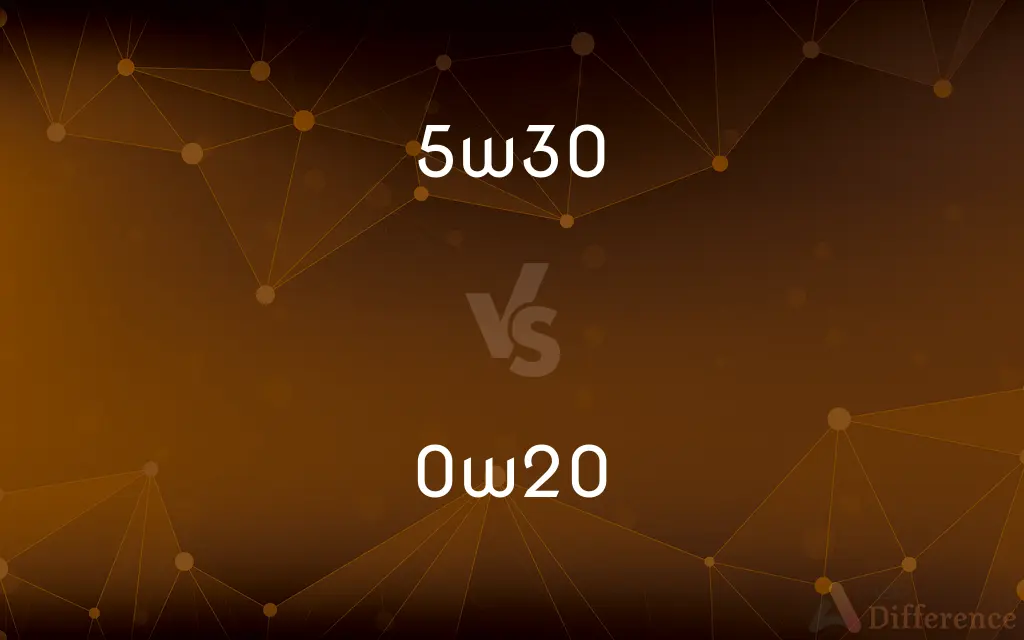5w30 vs. 0w20 — What's the Difference?
By Tayyaba Rehman — Published on January 22, 2024
5W30 is multi-grade oil where '5' indicates viscosity in cold temperatures, 'W' stands for winter, and '30' is viscosity. 0W20 is lighter oil than 5W30, '0' represents lower viscosity in cold temperatures, 'W' for winter, and '20' for thinner viscosity.

Difference Between 5w30 and 0w20
Table of Contents
ADVERTISEMENT
Key Differences
5W30 is a type of motor oil that provides good performance in various temperatures, ensuring engine protection and efficiency. 0W20, in contrast, is a thinner oil, particularly beneficial in colder environments and designed for newer car models, often improving fuel efficiency.
The number '5' in 5W30 indicates the oil's viscosity in cold temperatures, which is higher than the '0' in 0W20. This means 5W30 thickens less in cold weather compared to 0W20, affecting engine start-up performance in extreme conditions.
Regarding high temperature viscosity, indicated by the last number, 5W30 maintains a thicker consistency at engine operating temperatures than 0W20. This makes 5W30 suitable for a wider range of vehicles, including those operating in hotter climates or under heavy loads.
0W20 is often recommended for modern vehicles designed for maximum fuel efficiency and lower emissions. Conversely, 5W30 is versatile, suitable for many older and newer vehicle models, providing reliable lubrication and protection under various driving conditions.
Environmental factors and manufacturer recommendations play a crucial role in choosing between 5W30 and 0W20. While 5W30 offers broader applicability, 0W20 caters to specific modern engines that prioritize fuel economy and can operate with thinner oils.
ADVERTISEMENT
Comparison Chart
Cold Weather Viscosity
Higher (5)
Lower (0)
High Temperature Viscosity
Thicker (30)
Thinner (20)
Suitable Climates
Versatile, including hot
Colder and moderate
Vehicle Compatibility
Broad, older and newer models
Mainly modern, efficient models
Primary Advantages
Versatility, engine protection
Fuel efficiency, low emissions
Compare with Definitions
5w30
A lubricant providing engine protection for both older and newer vehicles.
My mechanic recommended 5W30 for my vintage car's engine maintenance.
0w20
An oil providing excellent engine protection, particularly in low temperatures.
I trust 0W20 to protect my engine during the harsh winter months.
5w30
Motor oil with moderate viscosity in cold and operating temperatures.
Choosing 5W30 ensures my engine runs smoothly in both winter and summer.
0w20
An oil type that enhances fuel economy due to its thinner consistency.
Since switching to 0W20, I've noticed an improvement in my car's fuel efficiency.
5w30
A versatile oil choice for a wide range of driving conditions.
For my cross-country road trip, I opted for 5W30 due to its adaptability.
0w20
Motor oil with lower viscosity at startup temperatures, reducing engine wear.
0W20 is great for my vehicle as it minimizes wear during cold starts.
5w30
An engine oil balancing between cold start capabilities and high-temperature protection.
5W30 ensures my car starts quickly in the cold and stays protected in the heat.
0w20
0W20 is a low-viscosity motor oil ideal for modern engines and cold climates.
My new car's manual recommends 0W20 for efficient performance in winter.
5w30
5W30 is a multi-grade motor oil suitable for varying temperature ranges.
I use 5W30 oil for my car because it adapts well to different weather conditions.
0w20
A suitable choice for newer vehicles designed to meet strict emission standards.
To meet environmental regulations, my eco-friendly car requires 0W20 oil.
Common Curiosities
What is the primary use of 0W20 oil?
It's used in modern vehicles for better fuel efficiency and cold-weather performance.
Is 0W20 better for the environment?
Yes, it often leads to lower emissions and improved fuel economy.
Can I use 5W30 instead of 0W20?
Only if your vehicle manufacturer approves it; they're not always interchangeable.
What does 5W30 mean?
It's a motor oil where '5' represents cold temperature viscosity, 'W' for winter, and '30' for operating temperature viscosity.
Can 5W30 improve engine life?
Yes, by providing consistent lubrication and protection under various conditions.
Does 5W30 affect fuel economy?
It might slightly reduce fuel efficiency compared to 0W20.
Does 0W20 offer better cold start performance?
Yes, its lower viscosity is advantageous in cold temperatures.
Should I use 0W20 in an older car?
Consult your vehicle's manual; it's typically for newer models.
Why is 5W30 popular in older vehicles?
Due to its suitability for a wide range of temperatures and engine types.
Is 0W20 only for winter use?
No, it's designed for year-round use, particularly in newer models.
Can 0W20 protect engines at high temperatures?
Yes, but not as effectively as thicker oils like 5W30.
Is 5W30 good for turbocharged engines?
Yes, it's often recommended for its protective qualities under high stress.
Are there any downsides to using 0W20?
It's not suitable for all engines, especially older or high-performance ones.
What climates is 5W30 best for?
It works well in both cold and hot climates.
Can I mix 5W30 and 0W20?
It's not recommended as it can alter the intended viscosity and performance.
Share Your Discovery

Previous Comparison
Tangerine Orange vs. Mandarin Orange
Next Comparison
LTD Companies vs. Pvt LTD CompaniesAuthor Spotlight
Written by
Tayyaba RehmanTayyaba Rehman is a distinguished writer, currently serving as a primary contributor to askdifference.com. As a researcher in semantics and etymology, Tayyaba's passion for the complexity of languages and their distinctions has found a perfect home on the platform. Tayyaba delves into the intricacies of language, distinguishing between commonly confused words and phrases, thereby providing clarity for readers worldwide.













































